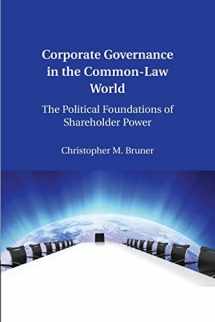
Corporate Governance in the Common-Law World: The Political Foundations of Shareholder Power
Book details
Summary
Description
The corporate governance systems of Australia, Canada, the United Kingdom, and the United States are often characterized as a single "Anglo-American" system prioritizing shareholders' interests over those of other corporate stakeholders. Such generalizations, however, obscure substantial differences across the common-law world. Contrary to popular belief, shareholders in the United Kingdom and jurisdictions following its lead are far more powerful and central to the aims of the corporation than are shareholders in the United States. This book presents a new comparative theory to explain this divergence and explores the theory's ramifications for law and public policy. Bruner argues that regulatory structures affecting other stakeholders' interests - notably differing degrees of social welfare protection for employees - have decisively impacted the degree of political opposition to shareholder-centric policies across the common-law world. These dynamics remain powerful forces today, and understanding them will be vital as post-crisis reforms continue to take shape.


We would LOVE it if you could help us and other readers by reviewing the book
Book review



